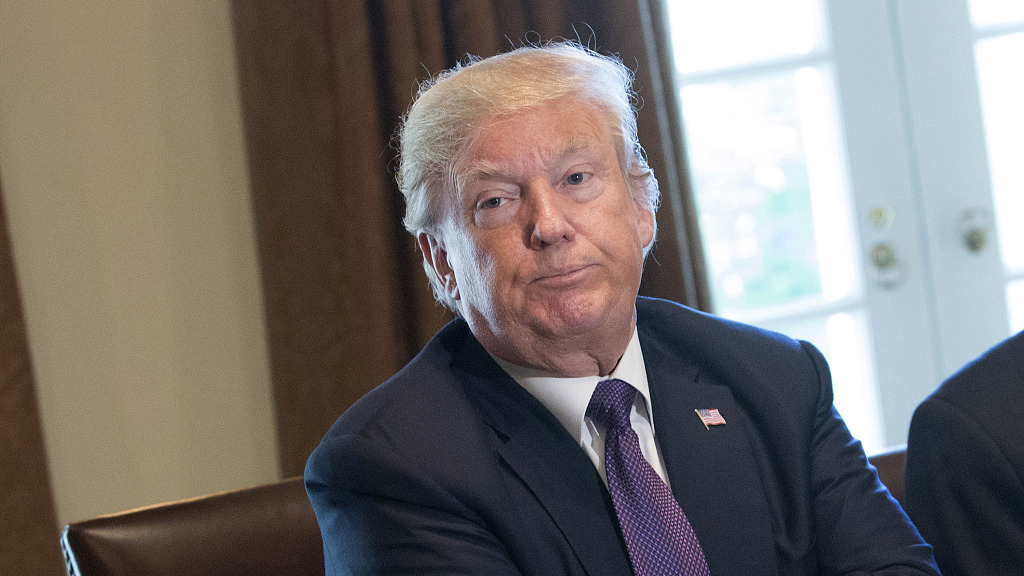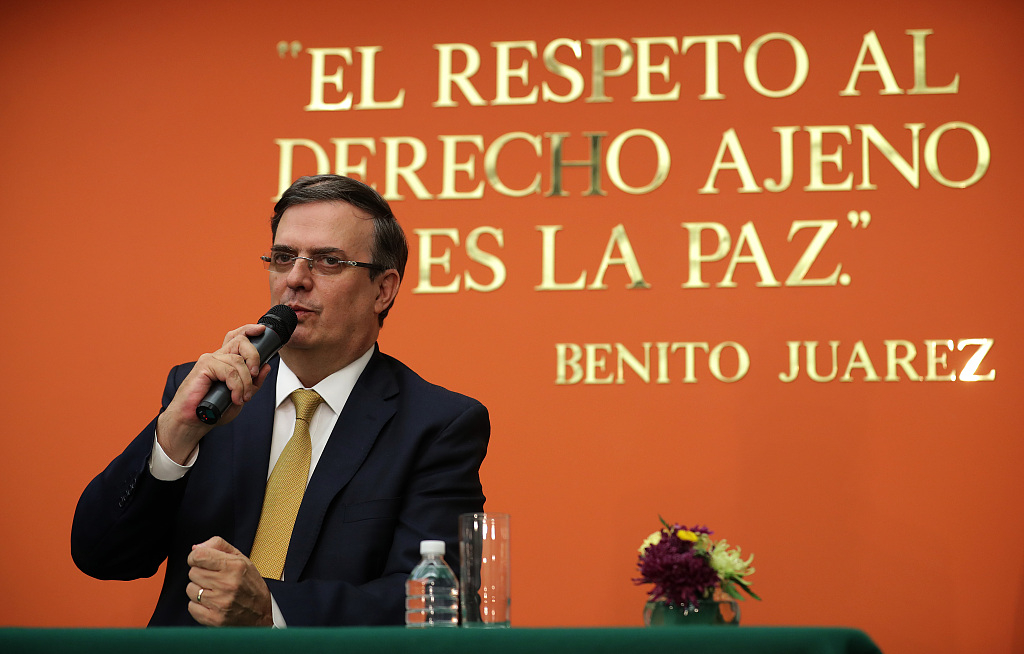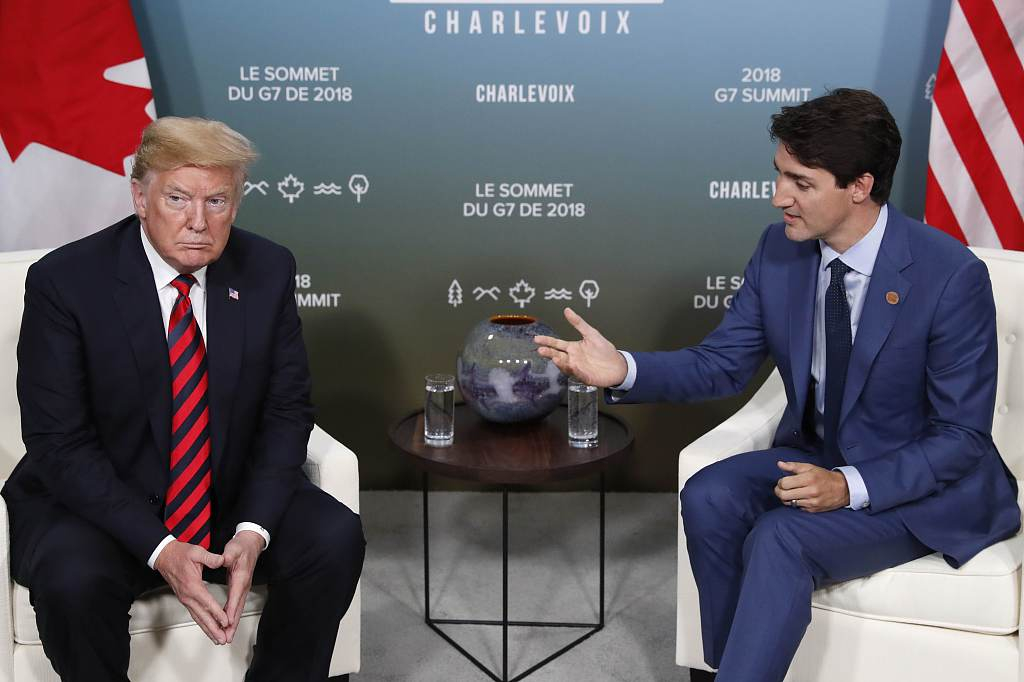
Opinion
20:56, 07-Jun-2019
The biggest threat to world economy
Bobby Naderi

Editor's note: Bobby Naderi is a journalist, current affairs commentator, documentary filmmaker and member of the Writers Guild of Great Britain. The article reflects the author's opinion, and not necessarily the views of CGTN.
It's a terrible shame that the so-called exceptional United States, a beacon of liberty, justice and fairness, continues to push the world economy against the wall with all those tariffs and trade frictions, even if it threatens a recession in the U.S, too.
Fighting back with facts, the World Bank is warning that as a consequence of the U.S. trade war with China, global business confidence has gone down the drain, slowdown in global trade has deepened, and investment in emerging and developing economies has dropped. Because of this worrisome and devastating trend, the International Monetary Fund (IMF) Managing Director Christine Lagarde is also warning that the unnecessary trade war and escalating tariff threats will decelerate global growth even further.
This terrible business outlook is only bolstered by the fact that much of the U.S. and global economic problems today can be traced back to Trump's political adventures and protectionist policies. The fall in stock markets is traced to his trade tussle with China. The recent investment loss in the manufacturing confidence in the U.S. has come as a direct consequence of the threat to slap tariffs on Mexican goods.
The new reports and warnings issued by the World Bank and the IMF are also tied to the U.S. role in destabilizing the global economy with its extended preoccupation with trade wars and tariffs, even against European allies.

Mexican Foreign Affairs Secretary Marcelo Ebrard holds a news conference at the Mexican Embassy following talks with U.S. Vice President Mike Pence and Secretary of State Mike Pompeo in Washington, DC, USA, June 5, 2019. /VCG Photo
Mexican Foreign Affairs Secretary Marcelo Ebrard holds a news conference at the Mexican Embassy following talks with U.S. Vice President Mike Pence and Secretary of State Mike Pompeo in Washington, DC, USA, June 5, 2019. /VCG Photo
To substantiate, Trump's threat to impose tariffs on Mexican goods starting Monday has cut investments in the U.S. market and increased manufacturing costs. According to the Center for Automotive Research (CAR), a 5 percent to 25 percent tariff rate on all imports from Mexico would mean a price increase of at least 5,400 U.S. dollars on an average new vehicle built in the U.S.
The Atlanta Federal Reserve (AFR) also says the recent selloff in stocks and a sharp drop in interest rates reflect investor worries over a slowing global economy. In its latest forecast, the AFR names the China-U.S. trade dispute and other protectionist measures that have raised costs for everybody and reduced economic activity.
Likewise, new papers published on the topic by the IMF, Harvard University, University of Chicago and the Federal Reserve Bank of Boston have found "nearly complete pass-through of tariffs" to America and that little cost is passed on to the Chinese manufacturers.
The situation is so desperate that many Congressional Republicans are also unwilling to swallow Trump's trade-war miscalculations. Media reports suggest this week that “White House Deputy Counsel Pat Philbin and Assistant Attorney General Steve Engel faced brutal push-back from the GOP, according to multiple senators, with some threatening that Trump could actually face a veto-proof majority to overturn the tariffs.”
This kind of opposition to Trump's tariffs and trade-war gambit should stun no one. It shows that Trump officials have been lying about their true intentions. The vast majority of their geopolitical intentions remains completely in the shadows and is never subjected to meaningful examination, which only increases the chances of market uncertainties with catastrophic consequences.
Of course, these are only some of the overwhelming facts and developments that have managed to make it into the news and onto the record.
After considering the trail of global economic consequences that follow the American flag wherever it goes, it is safe to say the U.S. is exceptional in many things; responsibility and fairness in global trade are not among them. The threat of new tariffs is also being consistently propped up by the concept of American exceptionalism. So, it's also safe to conclude that this makes the U.S. the biggest threat to global economic growth and stability.

U.S. President Donald Trump meets with Canada's Prime Minister Justin Trudeau in a bilateral meeting at the G7 Summit in Charlevoix, Quebec, Canada, June 8, 2018. /VCG Photo
U.S. President Donald Trump meets with Canada's Prime Minister Justin Trudeau in a bilateral meeting at the G7 Summit in Charlevoix, Quebec, Canada, June 8, 2018. /VCG Photo
Behind the clouds, however, Washington's trade-war goals are wishes, being fought for the worst possible reasons. The gambit is just a wish, a pie-in-the-sky ideal, without a definite and practical outcome. It comes from the egos of a decaying hegemonic power and a narcissistic president that don't live in a reality-based universe.
History shows us that those who launch trade wars are always defeated. History also tells us that China can protect itself in any escalating conflict. It could simply go beyond tariffs to increase pressure on the U.S. by using rare earth. The biggest holder of U.S. government debt, with about 1.12 trillion U.S. dollars, could also dump U.S. Treasuries.
It shouldn't escape attention that if Chinese President Xi Jinping ordered Beijing to target the U.S. economy this way, it would do so and, were that to happen, there can be little doubt about the ultimate negative outcome for the U.S. It would further upset American markets and push up interest rates and borrowing costs.
President Trump and his neocon faction should stop highlighting the positive aspects of their trade-war gambit. It is overblown. The pointless tussle, backed by no American ally in Europe and certainly no sound mind on Capitol Hill, is far less about trade balance and fair trade, and more about political power and American hegemony: The U.S. hegemony of the world and the trade and technological dictatorships of American corporations.
The futile efforts and tariff gambits by the Trumpsters, who advocate a doctrine of a permanent trade war, as well as their technological dictatorships, who try to push their opponents under the bus by supporting the post-colonial status quo, will only go this far. Their dreams of tariffing China into submission, dominating the world in financial-economic terms, and ensuring that no nation, or a bloc of nations, would ever challenge their unholy agenda, will never come true. What they fail to see is the catastrophe that their fantasies have caused for the U.S. and global economies.
If history is a witness, all nations who have accomplished great things have had great aims, too. They fixed their gaze on goals that were positive and high. The U.S.-imposed trade war on China is not a great thing at all. Behind the clouds, it's just a silly wish with no great goal and honor. It's not as though they were not warned of the inevitable blowback. The IMF and the World Bank say that's what lies ahead.
(If you want to contribute and have specific expertise, please contact us at opinions@cgtn.com)

SITEMAP
Copyright © 2018 CGTN. Beijing ICP prepared NO.16065310-3
Copyright © 2018 CGTN. Beijing ICP prepared NO.16065310-3